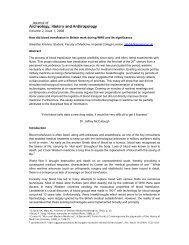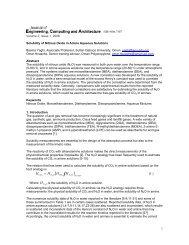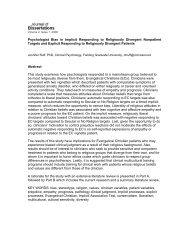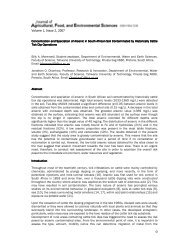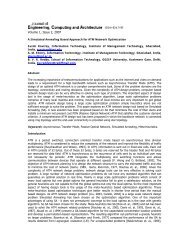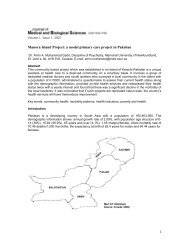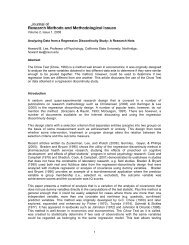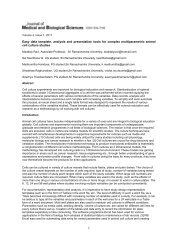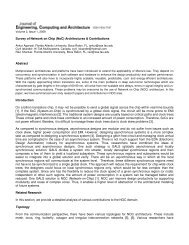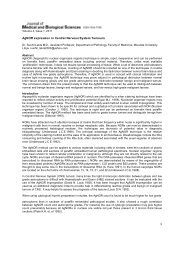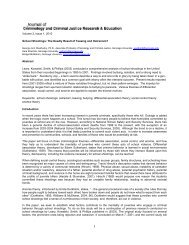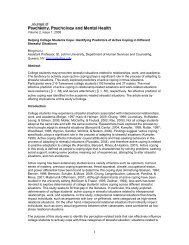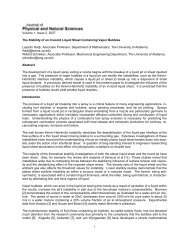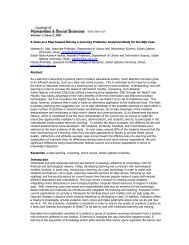The Heaven and Earth Society and the Red Turban Rebellion in ...
The Heaven and Earth Society and the Red Turban Rebellion in ...
The Heaven and Earth Society and the Red Turban Rebellion in ...
Create successful ePaper yourself
Turn your PDF publications into a flip-book with our unique Google optimized e-Paper software.
dissatisfaction was widespread. In his proclamations, Chen railed aga<strong>in</strong>st <strong>the</strong> harsh tax burden <strong>and</strong> o<strong>the</strong>r<br />
abuses perpetrated by <strong>the</strong> government. He abolished surcharges <strong>and</strong> remitted <strong>the</strong> l<strong>and</strong> tax for three years,<br />
after which it was to be collected at <strong>the</strong> basic rate. One source states that he acquired several thous<strong>and</strong><br />
followers <strong>in</strong> this way. 94 More often, however, <strong>the</strong> <strong>Red</strong> <strong>Turban</strong> rebels forced young men to fight for <strong>the</strong>m.<br />
Accord<strong>in</strong>g to a local gazetteer, Foshan Zhongyi xiangzhi, “Wherever <strong>the</strong> <strong>Red</strong> <strong>Turban</strong> b<strong>and</strong>its went, <strong>the</strong>y set<br />
houses on fire <strong>and</strong> forced men <strong>in</strong>to <strong>the</strong>ir service.” 95<br />
Dur<strong>in</strong>g periods of widespread upris<strong>in</strong>gs <strong>and</strong> social unrest, as was <strong>the</strong> case <strong>in</strong> 1854, whole<br />
communities jo<strong>in</strong>ed <strong>in</strong> <strong>the</strong> disturbances. At such times rebel forces were flooded with new recruits made up<br />
of <strong>the</strong> normally settled peasant farmers, <strong>and</strong> not just <strong>the</strong> rootless poor. Much of <strong>the</strong> <strong>in</strong>itial <strong>Red</strong> <strong>Turban</strong><br />
success was due to sudden switches of allegiance by <strong>the</strong> local people. Whole villages <strong>and</strong> blocs of villages<br />
might hoist <strong>the</strong> red flag <strong>and</strong> temporarily jo<strong>in</strong> <strong>the</strong> <strong>in</strong>surrectionist camp. 96 Some did this probably out of patriotic<br />
Ch<strong>in</strong>ese anti-Manchu sentiments, but <strong>the</strong> majorities were primarily concerned with <strong>the</strong>ir own security or<br />
motivated by <strong>the</strong> thought of ga<strong>in</strong>. Depend<strong>in</strong>g on <strong>the</strong> specific context, jo<strong>in</strong><strong>in</strong>g <strong>the</strong> <strong>in</strong>surrectionists might afford<br />
advantages <strong>in</strong> <strong>the</strong> conduct of <strong>in</strong>ter-clan or <strong>in</strong>ter-village relations. 97 Similarly, <strong>the</strong> non-jo<strong>in</strong>ers were not all<br />
motivated by reasons of loyalty to <strong>the</strong> Manchus or to <strong>the</strong> established order; <strong>the</strong>y might simply be act<strong>in</strong>g <strong>in</strong><br />
accordance with <strong>the</strong>ir own <strong>in</strong>terests. 98<br />
While forces of <strong>the</strong> <strong>Red</strong> <strong>Turban</strong>s seem certa<strong>in</strong>ly to have come largely from <strong>the</strong> humbler segments<br />
of society, rebels also managed to recruit several members of <strong>the</strong> local elite. Certa<strong>in</strong>ly, <strong>the</strong> pr<strong>in</strong>cipal <strong>Red</strong><br />
<strong>Turban</strong> leaders, for <strong>in</strong>stance, He Liu <strong>and</strong> Li Wenmao, were illiterates, <strong>and</strong> many o<strong>the</strong>r <strong>Red</strong> <strong>Turban</strong> leaders<br />
were also uneducated. 99 However, although bravery was essential for fight<strong>in</strong>g, bra<strong>in</strong>s were needed for<br />
plann<strong>in</strong>g. This need was filled by a number of scholars, some of whom had received <strong>the</strong> first degree through<br />
civil service exam<strong>in</strong>ation. 100 <strong>The</strong>y comm<strong>and</strong>ed great prestige <strong>and</strong> honor from <strong>the</strong> commoners.<br />
Unemployment, government pressure, heavy taxation, or illicit fees drove such scholars to serve <strong>the</strong> rebels.<br />
<strong>The</strong>se political advisers changed <strong>the</strong> nature of some Ti<strong>and</strong>ihui leaders to rebel k<strong>in</strong>gs. A notable<br />
example of <strong>the</strong> work of <strong>the</strong>se scholars was evidenced <strong>in</strong> “Lü Zigui gongci ,” a Q<strong>in</strong>g official records<br />
<strong>in</strong> Guangzhou. Chen Kai proclaimed himself as “Zhen’nanwang 鎭 男 王 (Guardian K<strong>in</strong>g of South)” which was<br />
planned by a bachelor (xiucai 秀 才 ), Lü Zigui 子 桂 . 101 He helped Chen perform <strong>the</strong> ceremony by<br />
sacrific<strong>in</strong>g to heaven <strong>and</strong> earth; <strong>the</strong>y drew up regulations <strong>and</strong> formed <strong>the</strong> military systems. Chen Kai also<br />
rewarded his chief lieutenants with titles <strong>and</strong> offices, issued proclamations, stepped up his recruitment<br />
efforts <strong>and</strong> f<strong>in</strong>ally created his own k<strong>in</strong>gdom, Dacheng’guo <strong>in</strong> 1855. 102 <strong>The</strong> military adviser for Chen Kai’s<br />
rebel k<strong>in</strong>gdom was also a stipendiary shengyuan 生 員 , Chen D<strong>in</strong>gxun 陳 鼎 勳 . 103<br />
Certa<strong>in</strong>ly <strong>the</strong>re were some local elite participated <strong>in</strong> rebellions but <strong>the</strong> image of rebels ma<strong>in</strong>ly<br />
composed by ‘drift<strong>in</strong>g population (youm<strong>in</strong>)’ still emerges as <strong>the</strong> dom<strong>in</strong>ant one. However, merely depict<strong>in</strong>g <strong>the</strong><br />
social background of <strong>the</strong> rebel participants is not sufficient to show <strong>the</strong> real picture of its composition. A<br />
discussion of <strong>the</strong> groups accord<strong>in</strong>g to <strong>the</strong>ir dialect would give us a much clearer underst<strong>and</strong><strong>in</strong>g of <strong>the</strong><br />
significance of <strong>the</strong> <strong>Red</strong> <strong>Turban</strong> <strong>Rebellion</strong>. <strong>The</strong> Q<strong>in</strong>g archival records used <strong>in</strong> this study reveal very<br />
<strong>in</strong>terest<strong>in</strong>g facts that shed much light on <strong>the</strong> identities of rebel participants. Several evidences show that <strong>the</strong><br />
related to M<strong>in</strong>g restorationism, see F.O. 931.1531 Proclamation by “Comm<strong>and</strong>er <strong>in</strong> Chief for <strong>the</strong><br />
Restoration of M<strong>in</strong>g,” (1855); “Dam<strong>in</strong>g Douyuanshuai xiwen 大 明明 都 元 帥 檄 文 ,” <strong>in</strong> Hongb<strong>in</strong>g Qiyi, 50-51;<br />
“Fum<strong>in</strong>g zongb<strong>in</strong>g dayuanshuai hong gaoshi, 复 明明 总 兵 大 元 帅 洪 告 示 ,” <strong>in</strong> Hongb<strong>in</strong>g Qiyi, 61.<br />
94<br />
Xunzhou Fuzhi 27.4-5.<br />
95 Foshan Zhongyi xiangzhi 佛 山 忠 義 鄕 志 , 11.14.<br />
96 Xiangshan Xianzhi, 15.30-40; Huizhou Fuzhi, 18.25; Guangzhou Fuzhi, 82.8.4.<br />
97 Wakeman, “Secret Societies,” 34-35.<br />
98 Ibid. ; “Shundexian huifeilan duanyuanyou 順 德 縣 會 匪 亂 端 緣 由 .” <strong>in</strong> Sasaki, Sh<strong>in</strong>matsu no himitsu<br />
kessha .Shiryō hen, 51; Xu’nanhai Xianzhi 續 南 海 縣 志 , 21.4.<br />
99 Dong’guan Xianzhi, 35.4; Xunanhai Xianzhi, 26.13, 18.14; Fanyu Xianzhi, 22.27.<br />
100 <strong>The</strong>re are some <strong>in</strong>stances of lower degree holders work<strong>in</strong>g with <strong>the</strong> rebels. See Jian, Quanshi, vol. 2,<br />
824; Nanhai Xianzhi, 15.12a; F.O. 931.1500. A note on gentry rebel who had led rebels <strong>in</strong> an attack on<br />
X<strong>in</strong>hui (1850s).<br />
101 “Lü Zigui gongci 呂 子 桂 供 詞 ,” <strong>in</strong> Hongb<strong>in</strong>g Qiyi, 108-110; Xu, L<strong>in</strong>g’nan, 236.<br />
102 Ibid.<br />
103 Yul<strong>in</strong> zhouzhi 鬱 林 州 志 , 18.60.<br />
16



